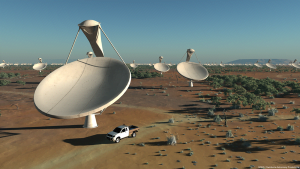
The Square Kilometre Array will be the world’s largest telescope, and likely need the world’s fastest supercomputer to handle the data it will produce. Credit: Swinburne Astronomy Productions/SPDO.
The world’s most powerful telescope – the new Square Kilometre Array (SKA) – is likely to need the world’s biggest computer to handle the incredible amount of data it will produce − and the International Centre for Radio Astronomy Research (ICRAR) is working out how to do it without breaking the bank.
ICRAR – a joint venture between Curtin University and The University of Western Australia – is working with the Canadian Astronomical Data Centre (CADC) to cost a new computer system to handle everything the SKA needs for the best price.
The $2 billion SKA project will generate one exabyte − more than 15 million iPods − of raw data a day which would cost hundreds of millions of dollars to store using currently available technology.
ICRAR’s head of computing, Professor Andreas Wicenec, said the work − part of a long-standing collaboration between ICRAR and CADC − would examine which parts of the SKA computing system would be most costly to build and operate.
“This will used to determine where research and development should be focused,” Professor Wicenec said.
“We have only three years of design and refinement before SKA construction begins, so we’ll need to be strategic about where our research is directed.”
Professor Wicenec said the CADC had extensive experience in dealing with telescope computing systems, including working with data from the Hubble Space Telescope and other projects.
However, the scale of the SKA was unprecedented in data processing history.
“We’re not just facing challenges in storing all that data but processing it into something useful,” Professor Wicenec said.
“Even powering a computer big enough to manage the huge task needs to be researched and developed.”
Professor Wicenec said the CADC-ICRAR collaboration was perfectly equipped to start work on these challenges.
He said CADC was one of the world’s leading groups for dealing with large amounts of astronomy data, and its valuable experience − combined with ICRAR’s radio astronomy knowledge − would provide an accurate estimate for the SKA’s computing needs.
The collaboration is one of several areas of SKA work coming out of Canada, which may officially join the SKA founding organisation in coming months.
The result of the Australian and New Zealand bid to host the SKA – in competition with a group of southern African countries − is expected in April this year.
SKA construction is due to start in 2016.
Contact for comment:
Professor Andreas Wicenec
Head of Computing | ICRAR
Email: andreas.wicenec@icrar.org – Mobile: +61 431 832 602
Kirsten Gottschalk
Media Contact | ICRAR
Tel: +61 8 6488 7771 – Mobile: +61 438 361 876 – Email: kirsten.gottschalk@icrar.org
Michael Sinclair-Jones
Media Manager I The University of Western Australia
Tel: +61 8 6488 3229 – Mobile: +61 400 700 783 – Email: michael.sinclair-jones@uwa.edu.au

